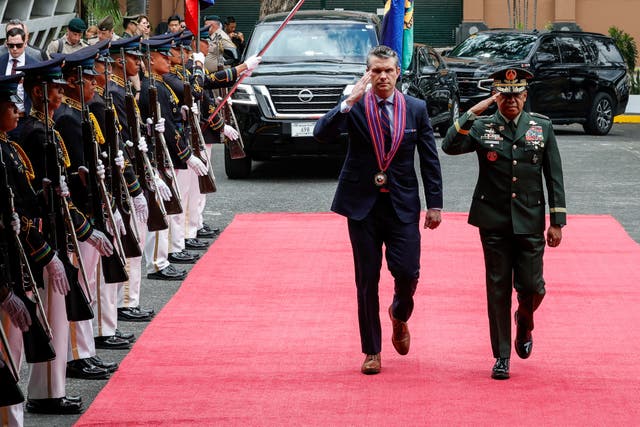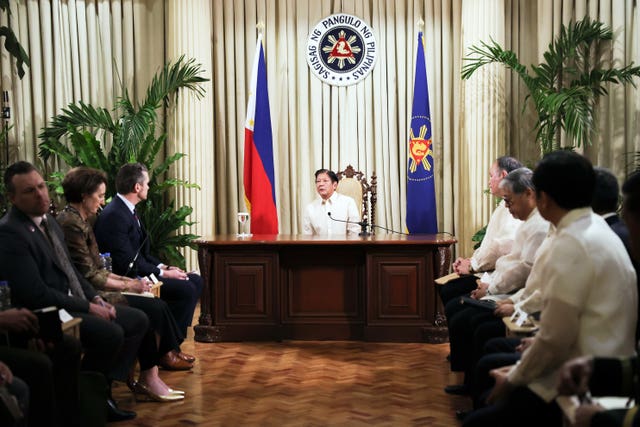US defence chief says stronger deterrence needed against China in disputed sea
Ahead of the visit, China called the United States a ‘predator’ and an unreliable ally.

US defence secretary Pete Hegseth said the Trump administration would boost military ties with the Philippines to strengthen deterrence against “threats from the communist Chinese” and ensure freedom of navigation in the disputed South China Sea.
Mr Hegseth spoke on Friday during a meeting with president Ferdinand Marcos Jr in the Philippines, his first stop in his first trip to Asia, to reaffirm Washington’s “ironclad” commitment to the region under Mr Trump.
Ahead of the visit, China called the United States a “predator” and an unreliable ally.
Mr Trump’s “America First” foreign policy thrust has triggered concerns in Asia about the scale and depth of the US commitment to the region.

Mr Hegseth’s decision to make the Philippines his first stop in Asia, followed by Japan — both US treaty allies facing territorial disputes with China — was the strongest assurance yet by the US under Mr Trump to maintain a security presence in the region.
“Deterrence is necessary around the world, but specifically in this region, in your country, considering the threats from the communist Chinese,” Mr Hegseth told Mr Marcos.
“Friends need to stand shoulder to shoulder to deter conflict, to ensure that there is free navigation, whether you call it the South China Sea or the West Philippine Sea.”
“Peace through strength is a very real thing,” Mr Hegseth said.
He praised the Philippines for standing “very firm” to defend its interests in the contested waters.
China claims virtually the entire South China Sea, a major security and global trade route.
The Philippines, Vietnam, Malaysia, Brunei and Taiwan also have overlapping claims to the resource-rich and busy waters, but confrontations have spiked between Chinese and Philippine coast guard and naval forces in the last two years.
Chinese forces have used powerful water cannons and dangerous manoeuvres in the high seas to block what Beijing said were encroachments by Philippine ships into China’s waters.
Chinese military aircraft have also approached Philippine patrol planes at alarmingly close distances to drive them away from the Scarborough Shoal, a hotly disputed fishing atoll in the disputed waterway.
Under the previous Biden administration, the US has repeatedly warned that it is obligated to help defend the Philippines if Filipino forces, ships and aircraft come under an armed attack in the Pacific, including in the South China Sea.
Mr Hegseth echoed that pledge by expressing “the ironclad commitment” of Mr Trump and him “to the Mutual Defence Treaty and to the partnership”.
Mr Marcos told the US defence chief that by visiting the Philippines first in Asia, he “sends a very strong message of the commitment of both our countries to continue to work together to maintain the peace in the Indo-Pacific region, within the South China Sea”.
“We have always understood the principle that the greatest force for peace in this part of the world would be the United States,” Mr Marcos said.

Ahead of Mr Hegseth’s visit, Chinese Defence Ministry spokesperson Wu Qian said China opposes “interference from outside countries” in the South China Sea.
“US-Philippines military cooperation must not harm the security interests of other countries or undermine regional peace and stability,” he said on Thursday in a monthly news conference.
He added without elaborating that the United States has “an astonishing record of breaking its promises and abandoning its allies” throughout its history.
Chinese Foreign Ministry spokesperson Guo Jiakun separately warned the Philippines in a news conference on Tuesday, “that nothing good could come out of opening the door to a predator”.
He added: “Those who willingly serve as chess pieces will be deserted in the end.”
Mr Hegseth’s visit to the Philippines comes a month before the longtime treaty allies hold the “Balikatan”, Tagalog for shoulder to shoulder, their largest annual combat exercises that include live-fire drills.
In recent years, the exercises have been held near the South China Sea and the sea border between the Philippines and Taiwan.
The defence secretary projected composure and camaraderie, as he had received harsh criticism for texting attack plans to a Signal group that included top-level US security officials and the editor-in-chief of The Atlantic magazine.





